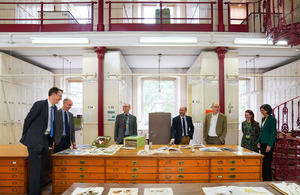News story
A £15 million investment to digitise the world’s largest collection of plant and fungal specimens will “revolutionise” climate change research and help protect biodiversity for generations to come, the Chief Secretary to the Treasury announced today (4 November).

-
Government to fund £15 million digitisation of the Herbarium at Kew Gardens in major boost to “revolutionise” climate change research during opening week of COP26.
-
The Chief Secretary to the Treasury, Simon Clarke, confirmed the funding on a visit to the world’s largest collection of plant and fungal specimens.
-
The historic archive spans 170 years and includes specimens collected by Charles Darwin.
Simon Clarke said the significant injection of government funding would allow researchers from across the globe to access the historic collection free of charge.
The Herbarium houses over 8 million plant and fungal specimens with some dating back 170 years – including specimens collected by Charles Darwin.
Digitising this treasure trove of information will also ensure that it is protected from gradual deterioration with age or catastrophic loss from fire.
Simon Clarke MP, Chief Secretary to the Treasury said:
This vital investment will revolutionise research to combat climate change and biodiversity loss. By digitising this unique collection, the largest of plant and fungal specimens in the world, we are opening up a vast stockpile of data which will seed a forest of vital research projects across the planet.
The Director of Kew Gardens, Richard Deverell, said:
I am absolutely delighted that the British Government has committed £15m towards the digitisation of Kew’s plant collections and to secure them for future generations through the construction of a new collections laboratory. These collections represent knowledge of plant and fungal diversity that will help scientists around the world conserve nature and find solutions to some of the most critical challenges facing humanity.
Dr Aaron Davis, Senior research leader in the Crops and Global Change team at Kew Gardens said:
The collections at Kew are a global resource that help us to understand what is happening to our biodiversity, how climate change is affecting nature and what we are losing. It was assembled by partners across the world so it is therefore only right that we speed up the process of digitising this data for everyone to use now in tackling species loss and ensuring we are making good choices that are sustainable for people and planet.
The government-funded project, which is estimated to take four years to complete, will also support ongoing projects at Kew, including mapping endangered tropical plants in East Africa and Madagascar, protecting vital biodiversity.
The Chief Secretary’s visit comes as world leaders have this week gathered for COP26 Glasgow and Governments have made unprecedented commitments to protect forests, reduce methane emissions and finance green technology.
Published 4 November 2021
Follow this news feed: HM Government





